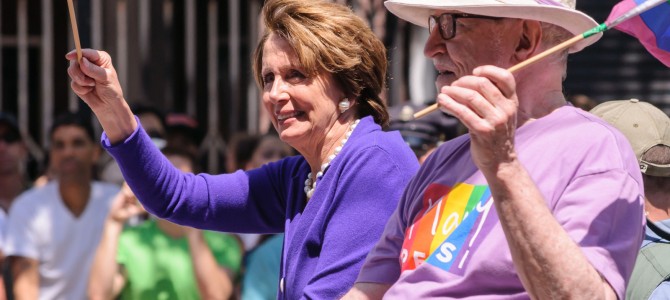
If I were a feistier person I’d have titled this article, “Ten Reasons Nancy Pelosi Should Just Shut Up About Religion Already,” and writing would have been facile and fast. After all, if there’s something both sides of our political divide can agree on, it should be that when Pelosi opens up about what mainline Christians and especially Catholics believe, she’s wrong. Usually very wrong. From her stance on abortion to her abysmal understanding of Catholicism’s doctrine on marriage, she espouses a Christianity at odds with logic, compassion, and general Bible literacy.
Her newest gaffe comes from her explanations that the Catholic Church is compatible with and supports same-sex marriage. On Sen. Marco Rubio’s support of traditional marriage Pelosi said, “I don’t even think that Pope Francis would subscribe to what Sen. Marco Rubio said supporting traditional marriage,” describing same-sex marriage as perfectly ‘consistent’ with Catholic teaching.
I’d like to refer Pelosi back to the Catechism of the Catholic Church on this point: “The matrimonial covenant, by which a man and a woman establish between themselves a partnership of the whole of life, is by its nature ordered toward the good of the spouses and the procreation and education of offspring; this covenant between baptized persons has been raised by Christ the Lord to the dignity of a sacrament.” So far, Rubio has declined to dignify Pelosi’s attempts to school him on Catholic doctrine with a response.
Churches Reconsider Performing Marriages
The definition of marriage is, of course, hotly contested. With the Supreme Court weighing the legality of gay marriage at the federal level, churches, businesses, and Americans in general are closely watching to see what the future holds for the institution of marriage.
Churches that ascribe to marriage as a union between one man and one woman are watching this closely. Justice Antonin Scalia (another Catholic) voiced the concern that clergy would be forced to marry people contrary to church doctrine—or lose their ability to perform any weddings at all—and these churches mirror his concern. Getting out of the “wedding business” is actually being discussed in numerous denominations in an attempt to sidestep the question of obeying both the laws of the land and the doctrinal laws of the church.
This might not be the first thing that comes to mind when picturing a church wedding, but it’s more than just a religious rite. It’s a legal, civil contract being executed, as well. Pastors who perform marriages act as agents of the state, and the marriage ceremony is every bit as binding as a marriage solemnized by a justice of the peace. This makes the clergy in question bound to both the laws of the land and the rules of their church body—and until recently the laws and doctrine of even very conservative church bodies agreed about who could get married. Marriage was a societal building block, and families springing forth from the vows all looked pretty similar: a man, a woman, and usually children followed.
This view has changed rapidly in the last two decades, though, with fewer people getting married at all. Cohabitation, single-parent families, divorce rates, marriages that include no children (by choice), and gay marriage have all shifted the old storybook picture of a nuclear family, and the law and religion are scrambling to keep up.
Social Norms Have Changed, But Church Teaching Hasn’t
Is marriage just a legal contract, binding together two people and letting them pool resources, share insurance, and tie them and their children together for purposes of medical decisions? Or is it something more?
The history of marriage in the Christian church was universal until recently. While the Old Testament included polygamy, by the New Testament everyone was pretty clear that marriage was a man, and a woman—the end. So things continued for about 2,000 years, right up until the Netherlands legalized gay marriage in 2001. From there, the last 14 years have seen countries and states wrestle with and ultimately ratify gay marriage on equal footing with traditional marriage.
The Supreme Court is not done weighing its decision, and, projections aside, it’s not decided until it’s over. Even after it’s decided, there is more to be discussed. Increasingly, LGBTQ people are saying, “marriage equality is largely symbolic and of secondary importance to the problems of LGBTQ homelessness, mental illness, and racism.”
So where does this leave conservative churches? In light of the potential Supreme Court decision some are already releasing statements and plans to stop performing all weddings. Others are sitting back, quietly watching, waiting, and praying. The church has survived and thrived through countless shifts of culture and laws and even governmental changes, and will come through this, as well.
The future of marriage in our laws and in our churches isn’t decided. Even if churches stop performing civil marriages, they can bless and celebrate marriages in religious ceremonies. This allows people to have their marriage blessed in their church home and removes the civil authority of the ceremony. Marriage and love will endure, even as the picture changes.









